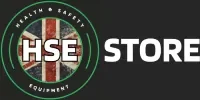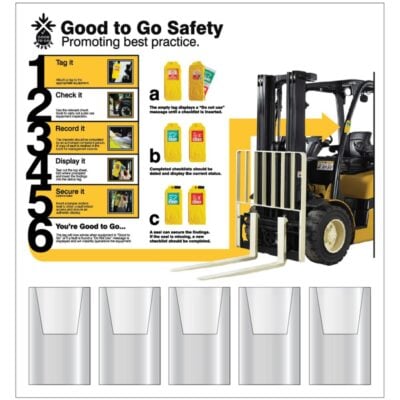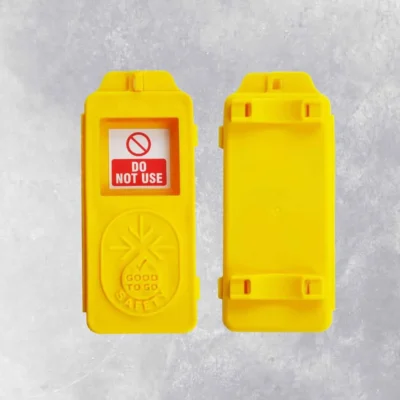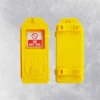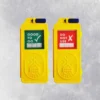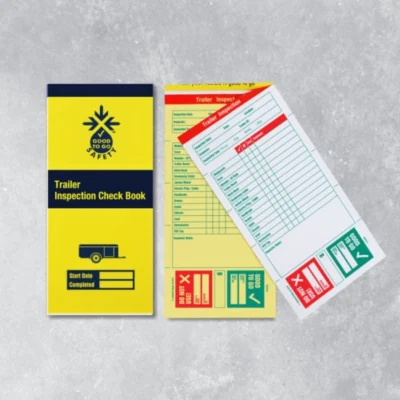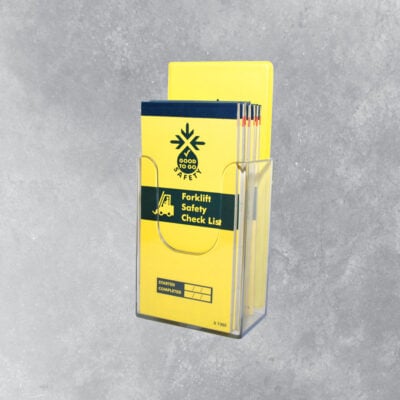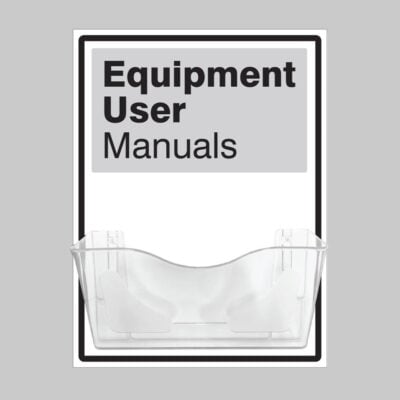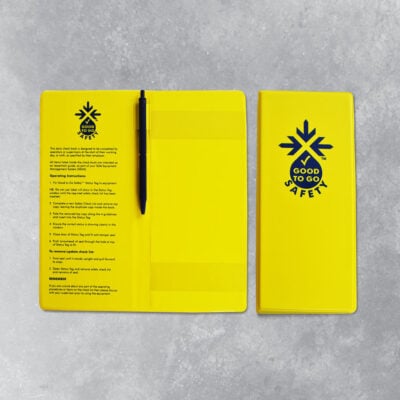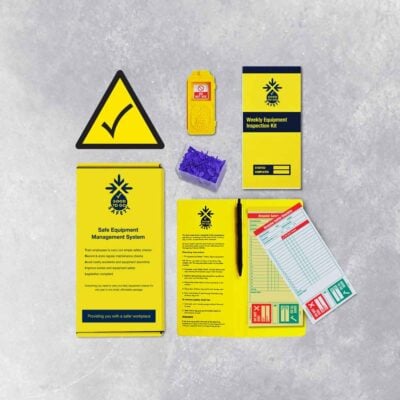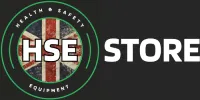-
Good To Go Safety Status Tag
From £7.50 Ex. VAT Select options This product has multiple variants. The options may be chosen on the product page -
Trailer Inspection Check Book – 25 Checklists
From £6.00 Ex. VAT Select options This product has multiple variants. The options may be chosen on the product page -
Good To Go – Equipment Inspection Book Dispenser
From £12.50 Ex. VAT Select options This product has multiple variants. The options may be chosen on the product page -
Good To Go – Weather Resistant Inspection Holder
From £6.00 Ex. VAT Select options This product has multiple variants. The options may be chosen on the product page -
Good To Go – Equipment Inspection Check Book Wallet & Pen
From £5.00 Ex. VAT Select options This product has multiple variants. The options may be chosen on the product page
Trailer Inspections – Ensure Road Safety, Legal Compliance & Equipment Reliability
Why Trailer Inspections Are Vital for Your Business
Trailers play a crucial role across numerous industries, from transportation and logistics to construction and agriculture. However, recent data reveals a worrying safety deficit: a startling 89% of trailers tested by the National Towing and Trailer Association (NTTA) failed safety checks due to defects. Defective trailers are a serious hazard, contributing to collisions and injuries on British roads. In 2017 alone, around 20 collisions involving trailers resulted in injury or death, with many linked to defects detectable by proper maintenance and inspection.
When operating trailers for work, companies are legally obliged under the Provision and Use of Work Equipment Regulations 1998 (PUWER) and The Road Vehicles (Construction and Use) Regulations 1986 to maintain trailers in safe condition. Regular and documented trailer inspections reduce risk, protect operators and the public, and help businesses avoid steep fines, driving bans, and penalty points. Keeping trailers “Good to Go” is essential not just for compliance, but for safeguarding your people, equipment, and reputation.
Our Trailer Inspection Product Range
HSE Store supplies the comprehensive Good to Go Safety range designed specifically for trailer inspections, making adherence to legal requirements straightforward:
-
Trailer Inspection Checklists / Check Books: Our detailed checklists cover all critical inspection points including chassis integrity, braking systems, lighting, tyres and wheels, couplings, and the secure loading of goods. Each completed checklist produces a duplicate carbon copy for management and audit records.
-
Status Tags: Durable tags attach near the trailer hitch or coupling point for maximum visibility. They clearly display the latest inspection status—“Good to Go” or “Do Not Use”—prompting operators to complete pre-use checks and preventing unsafe trailer use.
-
Tamper Evident Seals: Secure the inspection tag and checklist, ensuring inspection documentation cannot be tampered with or removed prematurely.
-
Information Posters: Displayed in loading areas and facilities, these posters remind staff of trailer inspection procedures and the importance of safety compliance.
-
Protective Wallets & Storage Boxes: Provide secure and organised storage for inspection books, tags, and accessories, ensuring records are preserved and readily accessible.
Our system offers flexibility to match your operational needs, whether inspections take place daily, weekly, or according to risk assessments.
Benefits of Using Trailer Inspection Systems
Implementing regular trailer inspections with Good to Go Safety products delivers clear advantages:
-
Enhances Road Safety: Early identification of defects such as brake failure, poor tyre condition or coupling faults reduces accidents and protects lives.
-
Ensures Legal Compliance: Maintains compliance with PUWER and Road Vehicles regulations, and provides audit-ready evidence in case of enforcement or insurance investigations.
-
Reduces Maintenance Costs: Timely detection of minor faults prevents costly breakdowns, extending trailer lifespan and reducing downtime.
-
Improves Operator Accountability: Visible status tags eliminate guesswork, making the inspection status instantly clear to all users.
-
Supports Operational Efficiency: Well-maintained trailers operate safely and reliably, ensuring smooth transport and supply chain performance.
Industries and Roles That Benefit from Trailer Inspection Products
Trailer inspections are crucial across a broad range of sectors where trailer use is common:
-
Logistics and Haulage Companies
-
Construction and Heavy Equipment Transport
-
Agriculture and Farming
-
Manufacturing and Distribution
-
Rental Fleet Operators and Maintenance Depots
Key users and stakeholders include:
-
Trailer Operators and Drivers: Responsible for completing pre-use safety checks before journeys.
-
Site and Fleet Managers: Ensure inspection regimes are followed and equipment safety is monitored.
-
Health & Safety Coordinators: Audit inspection records and maintain safety standards.
-
Maintenance Team: Address defects reported during inspections and schedule preventive repairs.
-
Business Owners and Directors: Oversee regulatory compliance and protect corporate reputation.
How the Good to Go Safety Trailer Inspection System Works
Good to Go Safety provides a practical, reliable framework for trailer safety management:
-
Attach the status tag near the hitch or coupling point to ensure high visibility.
-
Complete the pre-use trailer inspection checklist using provisions from the checkbook, running through vital safety components and load security.
-
Insert the top copy of the completed checklist inside the status tag, which now prominently displays the inspection date and status — “Good to Go” or “Do Not Use.”
-
Retain the duplicate checklist within the inspection book as a permanent management record providing a verified audit trail.
-
Adjust the frequency of inspections based on operational risk assessment—from daily for high-use trailers to annual checks where appropriate.
-
If defects are found, the trailer is immediately flagged as “Do Not Use,” effectively quarantining it until repairs have been made and verified via re-inspection.
This system delivers peace of mind, enabling businesses to manage trailer safety proactively and compliantly.
Frequently Asked Questions (FAQs)
1. How often should trailers be inspected?
Inspection frequency depends on risk assessments but must be at least annual. For high-use or hazardous environments, daily or weekly pre-use checks are strongly recommended.
2. Who should carry out trailer inspections?
Operators or drivers should perform pre-use inspections, while supervisors and safety teams oversee compliance and maintenance schedules.
3. What should happen if a trailer fails inspection?
If a defect affecting safety is identified, the trailer must be clearly marked “Do Not Use” and removed from service immediately. Repairs must be completed before reuse.
4. What are the legal requirements for trailer maintenance?
Trailers used for work must comply with PUWER and The Road Vehicles (Construction and Use) Regulations 1986, requiring regular inspections, maintenance, and records.
5. Why use dedicated trailer inspection checklists and tags?
Purpose-made checklists cover all relevant safety aspects systematically, while status tags provide instant visual confirmation of the inspection status, reducing risk and ensuring compliance.
Choose HSE Store for trusted Trailer Inspection products—maximise your fleet’s safety, ensure regulatory compliance, and protect your workforce and reputation with industry-leading solutions.
